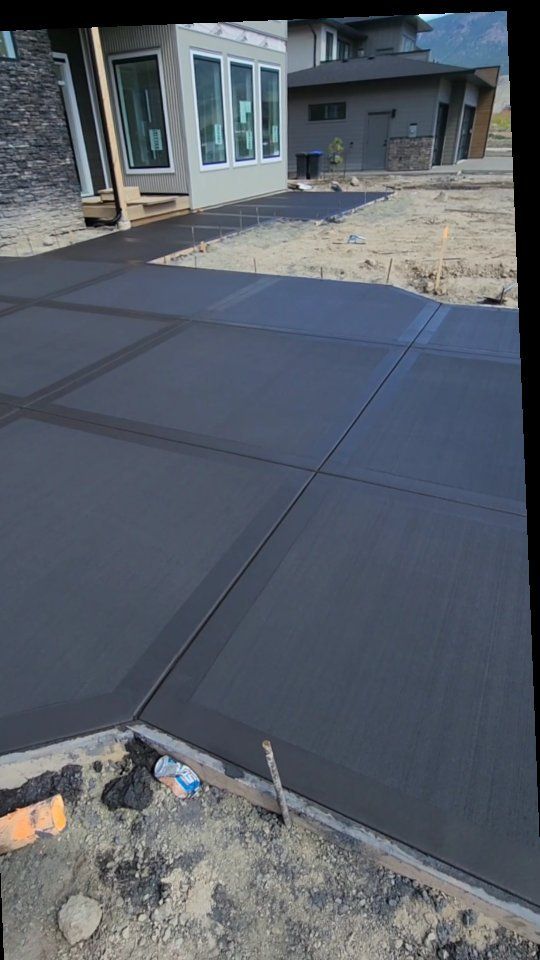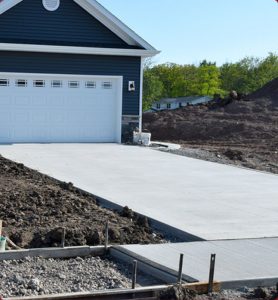Concrete vs. Asphalt: Which Driveway Material Suits Your Home?
Concrete and asphalt are both popular choices for driveways, but they differ in terms of durability and longevity. Concrete driveways are known for their exceptional strength and durability, often lasting up to 30 years or more with proper maintenance. The solid nature of concrete makes it resistant to heavy loads and harsh weather conditions, making it an ideal choice for high-traffic areas.
On the other hand, asphalt driveways have a slightly shorter lifespan, typically lasting around 20 years. While asphalt is more flexible and can withstand freezing and thawing without cracking, it requires regular sealing and maintenance to prolong its lifespan. In terms of longevity, concrete driveways have the upper hand due to their robust nature and ability to withstand wear and tear over an extended period.
However, both materials can provide long-lasting performance when properly installed and maintained.
Initial Installation Costs
Concrete driveways are generally more expensive to install compared to asphalt driveways. The cost of concrete is influenced by factors such as the quality of materials, labor costs, and the complexity of the design. Additionally, concrete requires a curing period, which can extend the installation timeline and increase labor costs.
Asphalt: A Budget-Friendly Option
On the other hand, asphalt driveways are more cost-effective in terms of initial installation. The lower cost of materials and faster installation process make asphalt a budget-friendly option for homeowners.
Long-Term Maintenance Costs
However, it’s important to consider long-term maintenance costs when comparing the overall expenses of concrete and asphalt driveways. While asphalt may have lower upfront costs, it requires more frequent maintenance, such as seal coating and crack repairs, which can add up over time.
Key Takeaways
- Concrete driveways are more durable and have a longer lifespan compared to asphalt driveways.
- Asphalt driveways are generally more cost-effective to install than concrete driveways.
- Concrete driveways require less maintenance and upkeep compared to asphalt driveways.
- Concrete driveways offer a wider range of design options and can enhance the curb appeal of a home.
- Asphalt driveways have a lower environmental impact and are more eco-friendly compared to concrete driveways.
Maintenance Requirements: Understanding the Upkeep for Concrete and Asphalt Driveways
Maintenance is a crucial aspect to consider when choosing between concrete and asphalt driveways. Concrete driveways are relatively low-maintenance, requiring periodic sealing to protect against stains, moisture penetration, and surface damage. Additionally, regular cleaning and minor repairs can help prolong the lifespan of a concrete driveway.
In contrast, asphalt driveways demand more frequent maintenance to preserve their appearance and structural integrity. Seal coating is essential to protect the surface from water damage, UV exposure, and oil stains. Furthermore, periodic resealing and crack repairs are necessary to prevent deterioration and prolong the lifespan of an asphalt driveway.
While both concrete and asphalt driveways require maintenance, the frequency and extent of upkeep differ between the two materials. Homeowners should consider their willingness to invest time and resources into driveway maintenance when making a decision.
Aesthetics and Curb Appeal: Enhancing Your Home with Concrete or Asphalt Driveways
The aesthetic appeal of a driveway plays a significant role in enhancing the overall curb appeal of a home. Concrete driveways offer a versatile range of design options, including stamped patterns, exposed aggregates, and various color choices. This flexibility allows homeowners to customize their driveways to complement the architectural style of their homes and create a unique visual impact.
On the other hand, asphalt driveways are known for their classic black appearance, which can provide a sleek and uniform look to a property. While asphalt offers fewer design options compared to concrete, it can still contribute to a clean and polished aesthetic when properly maintained. Ultimately, the choice between concrete and asphalt driveways in terms of aesthetics depends on the homeowner’s preference for design versatility or a more traditional appearance that complements their property.
The environmental impact of driveway materials is an important consideration for environmentally conscious homeowners. Concrete is known for its durability and ability to be recycled or repurposed at the end of its lifespan, making it a sustainable choice for driveways. Additionally, concrete reflects light rather than absorbing heat, which can contribute to cooler temperatures in urban areas, known as the “heat island effect.” In contrast, asphalt is a petroleum-based product that raises concerns about its environmental impact.
The production process of asphalt involves the use of fossil fuels, and its dark color absorbs heat, contributing to higher temperatures in urban environments. However, advancements in recycling technologies have made it possible to reuse asphalt materials, reducing its environmental footprint. When considering the environmental impact of driveway materials, homeowners may prioritize the recyclability and reflective properties of concrete or explore sustainable practices in asphalt production.
Weather Resistance: How Concrete and Asphalt Driveways Perform in Different Climates
| Climate | Concrete Driveway Performance | Asphalt Driveway Performance |
|---|---|---|
| Cold | May crack in freezing temperatures | Can become brittle and crack in extreme cold |
| Hot | May experience surface spalling in extreme heat | Can become soft and prone to deformation in high temperatures |
| Wet | Resistant to water damage | May experience erosion and rutting in heavy rain |
| Dry | Resistant to dry conditions | May become brittle and prone to cracking in prolonged dry spells |
The performance of driveways in various climates is a crucial factor for homeowners living in regions with extreme weather conditions. Concrete driveways are well-suited for areas with hot climates as they can withstand high temperatures without softening or becoming pliable. Additionally, concrete is resistant to UV damage and does not become slippery when wet, making it suitable for rainy regions.
On the other hand, asphalt driveways are ideal for colder climates due to their ability to flex without cracking during freeze-thaw cycles. The dark color of asphalt also helps in melting snow and ice faster than concrete, making it advantageous in regions with heavy snowfall. Homeowners should consider their local climate and weather patterns when choosing between concrete and asphalt driveways to ensure optimal performance and longevity.
Installation Process: The Differences Between Pouring Concrete and Laying Asphalt for Your Driveway:

The installation process for concrete and asphalt driveways varies significantly in terms of materials, preparation, and timeline. Concrete driveways require meticulous planning and preparation, including excavation, grading, forming, pouring, finishing, and curing. The curing process is crucial for concrete to achieve its full strength and durability, requiring adequate time before the driveway can be used.
In contrast, the installation of an asphalt driveway involves laying hot mix asphalt onto a prepared base layer. The speed of installation is one of the key advantages of asphalt driveways, as they can typically be used within a few days after installation. However, proper compaction and sealing are essential for ensuring the longevity and performance of an asphalt driveway.
Ultimately, homeowners should consider the installation timeline, preparation requirements, and curing period when deciding between concrete and asphalt driveways based on their specific needs and preferences. In conclusion, choosing between concrete and asphalt driveways involves considering various factors such as durability, cost, maintenance requirements, aesthetics, environmental impact, weather resistance, and installation processes. By carefully evaluating these aspects based on individual preferences and local conditions, homeowners can make an informed decision that best suits their home and lifestyle.
FAQs
What are the key differences between concrete and asphalt driveways?
Concrete driveways are made of a mixture of cement, water, and aggregates, while asphalt driveways are made of a mixture of bitumen and aggregates. Concrete driveways tend to have a lighter color and a smoother surface, while asphalt driveways are typically black and have a rougher texture.
How long do concrete and asphalt driveways typically last?
Concrete driveways generally have a longer lifespan, lasting up to 30 years or more with proper maintenance. Asphalt driveways typically last around 20 years, but may require more frequent maintenance and repairs.
What are the cost differences between installing a concrete and asphalt driveway?
Concrete driveways are initially more expensive to install compared to asphalt driveways. However, over time, the maintenance costs for asphalt driveways may make them more expensive in the long run.
What kind of maintenance do concrete and asphalt driveways require?
Concrete driveways require sealing every few years to maintain their appearance and prevent cracking. Asphalt driveways require regular resealing every 3-5 years to protect against water damage and cracking.
How do concrete and asphalt driveways affect the curb appeal of a home?
Concrete driveways are known for their clean, modern look and can enhance the curb appeal of a home. Asphalt driveways have a more traditional appearance and can complement certain architectural styles.
What is the environmental impact of choosing a concrete or asphalt driveway?
Concrete production has a higher carbon footprint compared to asphalt production. However, asphalt driveways are 100% recyclable, which can offset some of the environmental impact.
How do concrete and asphalt driveways perform in different climates?
Concrete driveways can withstand extreme heat, but may crack in freezing temperatures. Asphalt driveways are more flexible and less prone to cracking in cold weather, but can soften in extreme heat.
What is the installation process for concrete and asphalt driveways?
Concrete driveways are poured and then cured over several days, while asphalt driveways are laid and compacted in a shorter timeframe. Concrete driveways may take longer to install, but they have a longer curing time before they can be used.

